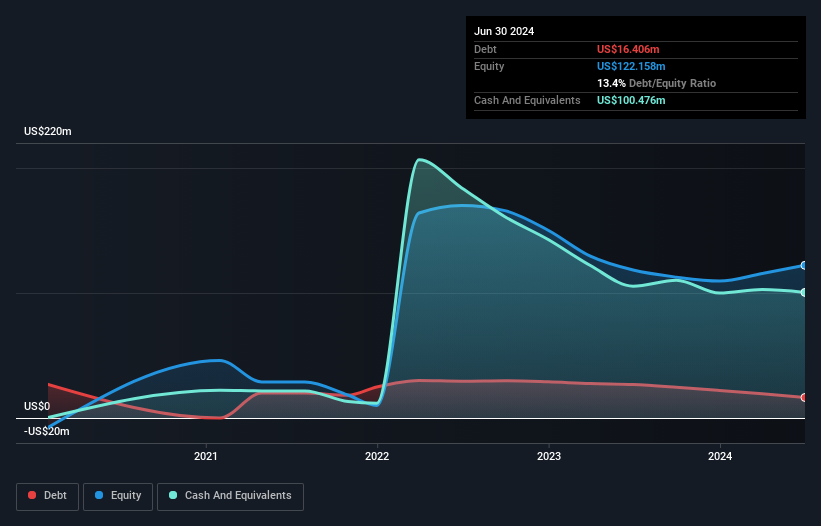Health Check: How Prudently Does Rigetti Computing (NASDAQ:RGTI) Use Debt?
Legendary fund manager Li Lu (who Charlie Munger backed) once said, 'The biggest investment risk is not the volatility of prices, but whether you will suffer a permanent loss of capital.' So it seems the smart money knows that debt - which is usually involved in bankruptcies - is a very important factor, when you assess how risky a company is. We can see that Rigetti Computing, Inc. (NASDAQ:RGTI) does use debt in its business. But should shareholders be worried about its use of debt?
What Risk Does Debt Bring?
Debt and other liabilities become risky for a business when it cannot easily fulfill those obligations, either with free cash flow or by raising capital at an attractive price. If things get really bad, the lenders can take control of the business. However, a more common (but still painful) scenario is that it has to raise new equity capital at a low price, thus permanently diluting shareholders. Of course, the upside of debt is that it often represents cheap capital, especially when it replaces dilution in a company with the ability to reinvest at high rates of return. The first step when considering a company's debt levels is to consider its cash and debt together.
Check out our latest analysis for Rigetti Computing
What Is Rigetti Computing's Net Debt?
You can click the graphic below for the historical numbers, but it shows that Rigetti Computing had US$16.4m of debt in June 2024, down from US$26.8m, one year before. However, it does have US$100.5m in cash offsetting this, leading to net cash of US$84.1m.

How Healthy Is Rigetti Computing's Balance Sheet?
The latest balance sheet data shows that Rigetti Computing had liabilities of US$25.6m due within a year, and liabilities of US$14.7m falling due after that. Offsetting these obligations, it had cash of US$100.5m as well as receivables valued at US$5.23m due within 12 months. So it actually has US$65.5m more liquid assets than total liabilities.
This surplus strongly suggests that Rigetti Computing has a rock-solid balance sheet (and the debt is of no concern whatsoever). With this in mind one could posit that its balance sheet means the company is able to handle some adversity. Succinctly put, Rigetti Computing boasts net cash, so it's fair to say it does not have a heavy debt load! When analysing debt levels, the balance sheet is the obvious place to start. But it is future earnings, more than anything, that will determine Rigetti Computing's ability to maintain a healthy balance sheet going forward. So if you're focused on the future you can check out this free report showing analyst profit forecasts.
In the last year Rigetti Computing had a loss before interest and tax, and actually shrunk its revenue by 12%, to US$13m. That's not what we would hope to see.
So How Risky Is Rigetti Computing?
We have no doubt that loss making companies are, in general, riskier than profitable ones. And the fact is that over the last twelve months Rigetti Computing lost money at the earnings before interest and tax (EBIT) line. And over the same period it saw negative free cash outflow of US$54m and booked a US$68m accounting loss. But at least it has US$84.1m on the balance sheet to spend on growth, near-term. Even though its balance sheet seems sufficiently liquid, debt always makes us a little nervous if a company doesn't produce free cash flow regularly. There's no doubt that we learn most about debt from the balance sheet. However, not all investment risk resides within the balance sheet - far from it. Be aware that Rigetti Computing is showing 3 warning signs in our investment analysis , you should know about...
When all is said and done, sometimes its easier to focus on companies that don't even need debt. Readers can access a list of growth stocks with zero net debt 100% free, right now.
Have feedback on this article? Concerned about the content? Get in touch with us directly. Alternatively, email editorial-team (at) simplywallst.com.
This article by Simply Wall St is general in nature. We provide commentary based on historical data and analyst forecasts only using an unbiased methodology and our articles are not intended to be financial advice. It does not constitute a recommendation to buy or sell any stock, and does not take account of your objectives, or your financial situation. We aim to bring you long-term focused analysis driven by fundamental data. Note that our analysis may not factor in the latest price-sensitive company announcements or qualitative material. Simply Wall St has no position in any stocks mentioned.
 Index Options
Index Options CME Group
CME Group Nasdaq
Nasdaq Cboe
Cboe TradingView
TradingView Wall Street Journal
Wall Street Journal